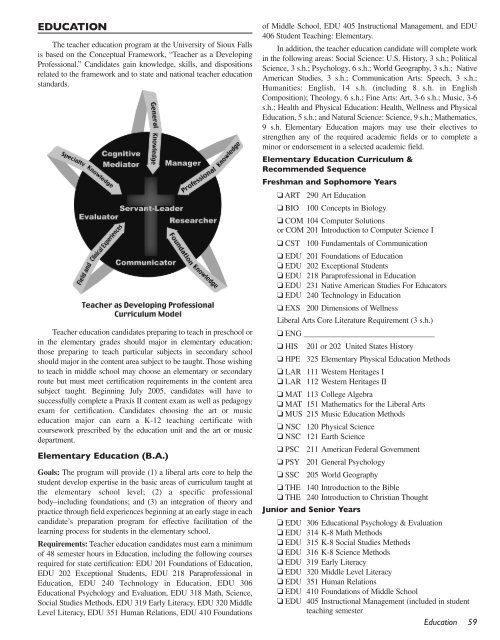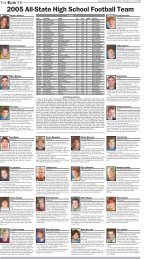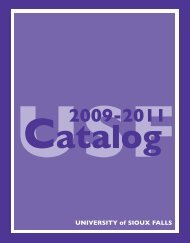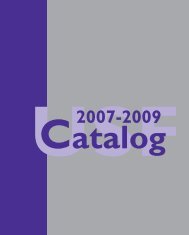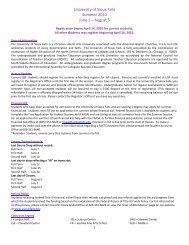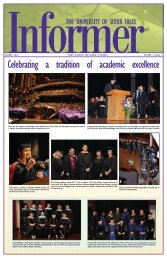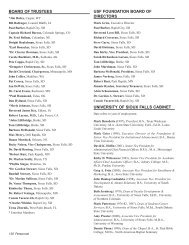USF TELEPHONE DIRECTORY - University of Sioux Falls
USF TELEPHONE DIRECTORY - University of Sioux Falls
USF TELEPHONE DIRECTORY - University of Sioux Falls
You also want an ePaper? Increase the reach of your titles
YUMPU automatically turns print PDFs into web optimized ePapers that Google loves.
EDUCATION<br />
The teacher education program at the <strong>University</strong> <strong>of</strong> <strong>Sioux</strong> <strong>Falls</strong><br />
is based on the Conceptual Framework, “Teacher as a Developing<br />
Pr<strong>of</strong>essional.” Candidates gain knowledge, skills, and dispositions<br />
related to the framework and to state and national teacher education<br />
standards.<br />
Teacher education candidates preparing to teach in preschool or<br />
in the elementary grades should major in elementary education;<br />
those preparing to teach particular subjects in secondary school<br />
should major in the content area subject to be taught. Those wishing<br />
to teach in middle school may choose an elementary or secondary<br />
route but must meet certification requirements in the content area<br />
subject taught. Beginning July 2005, candidates will have to<br />
successfully complete a Praxis II content exam as well as pedagogy<br />
exam for certification. Candidates choosing the art or music<br />
education major can earn a K-12 teaching certificate with<br />
coursework prescribed by the education unit and the art or music<br />
department.<br />
Elementary Education (B.A.)<br />
Goals: The program will provide (1) a liberal arts core to help the<br />
student develop expertise in the basic areas <strong>of</strong> curriculum taught at<br />
the elementary school level; (2) a specific pr<strong>of</strong>essional<br />
body–including foundations; and (3) an integration <strong>of</strong> theory and<br />
practice through field experiences beginning at an early stage in each<br />
candidate’s preparation program for effective facilitation <strong>of</strong> the<br />
learning process for students in the elementary school.<br />
Requirements: Teacher education candidates must earn a minimum<br />
<strong>of</strong> 48 semester hours in Education, including the following courses<br />
required for state certification: EDU 201 Foundations <strong>of</strong> Education,<br />
EDU 202 Exceptional Students, EDU 218 Parapr<strong>of</strong>essional in<br />
Education, EDU 240 Technology in Education, EDU 306<br />
Educational Psychology and Evaluation, EDU 318 Math, Science,<br />
Social Studies Methods, EDU 319 Early Literacy, EDU 320 Middle<br />
Level Literacy, EDU 351 Human Relations, EDU 410 Foundations<br />
<strong>of</strong> Middle School, EDU 405 Instructional Management, and EDU<br />
406 Student Teaching: Elementary.<br />
In addition, the teacher education candidate will complete work<br />
in the following areas: Social Science: U.S. History, 3 s.h.; Political<br />
Science, 3 s.h.; Psychology, 6 s.h.; World Geography, 3 s.h.; Native<br />
American Studies, 3 s.h.; Communication Arts: Speech, 3 s.h.;<br />
Humanities: English, 14 s.h. (including 8 s.h. in English<br />
Composition); Theology, 6 s.h.; Fine Arts: Art, 3-6 s.h.; Music, 3-6<br />
s.h.; Health and Physical Education: Health, Wellness and Physical<br />
Education, 5 s.h.; and Natural Science: Science, 9 s.h.; Mathematics,<br />
9 s.h. Elementary Education majors may use their electives to<br />
strengthen any <strong>of</strong> the required academic fields or to complete a<br />
minor or endorsement in a selected academic field.<br />
Elementary Education Curriculum &<br />
Recommended Sequence<br />
Freshman and Sophomore Years<br />
❏ ART 290 Art Education<br />
❏ BIO 100 Concepts in Biology<br />
❏ COM 104 Computer Solutions<br />
or COM 201 Introduction to Computer Science I<br />
❏ CST 100 Fundamentals <strong>of</strong> Communication<br />
❏ EDU 201 Foundations <strong>of</strong> Education<br />
❏ EDU 202 Exceptional Students<br />
❏ EDU 218 Parapr<strong>of</strong>essional in Education<br />
❏ EDU 231 Native American Studies For Educators<br />
❏ EDU 240 Technology in Education<br />
❏ EXS 200 Dimensions <strong>of</strong> Wellness<br />
Liberal Arts Core Literature Requirement (3 s.h.)<br />
❏ ENG _________________________________<br />
❏ HIS 201 or 202 United States History<br />
❏ HPE 325 Elementary Physical Education Methods<br />
❏ LAR 111 Western Heritages I<br />
❏ LAR 112 Western Heritages II<br />
❏ MAT 113 College Algebra<br />
❏ MAT 151 Mathematics for the Liberal Arts<br />
❏ MUS 215 Music Education Methods<br />
❏ NSC 120 Physical Science<br />
❏ NSC 121 Earth Science<br />
❏ PSC 211 American Federal Government<br />
❏ PSY 201 General Psychology<br />
❏ SSC 205 World Geography<br />
❏ THE 140 Introduction to the Bible<br />
❏ THE 240 Introduction to Christian Thought<br />
Junior and Senior Years<br />
❏ EDU 306 Educational Psychology & Evaluation<br />
❏ EDU 314 K-8 Math Methods<br />
❏ EDU 315 K-8 Social Studies Methods<br />
❏ EDU 316 K-8 Science Methods<br />
❏ EDU 319 Early Literacy<br />
❏ EDU 320 Middle Level Literacy<br />
❏ EDU 351 Human Relations<br />
❏ EDU 410 Foundations <strong>of</strong> Middle School<br />
❏ EDU 405 Instructional Management (included in student<br />
teaching semester<br />
Education 59


